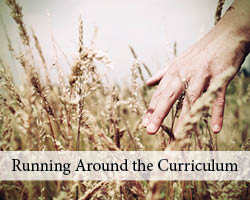Just last night I hosted a webinar with author Sarah Mackenzie, who wrote Teaching from Rest. The topic for the webinar was “Curriculum Is Not Something You Buy.”
The conversation went well. Clearly, like traditional-school parents, homeschool and private-school parents struggle to maintain a “balanced life.” Put another way, most parents and students must confront educational stress and anxiety.
There are a lot of reasons why parents have become anxious about education:
- Many are uncertain about what a good education should be, so we don’t know what we are aiming for. We are not confident that we have had a great education, so we are hesitant to just give our children what we received.
- If we have adopted the aims of a classical, liberal arts education (a fine goal) we remain uncertain of what to do. How do we give to our kids what we have not received?
- Our modern moment is full of educational controversy: More STEM! No, let’s make that STEAM (the A is for art)! More standardized assessments; Common Core Standards. No, let’s reject these and return to the basics!
- Families pursuing a classical education at home or in a private school make great sacrifices (in terms of time and money) to educate their children. This can heighten anxiety: we have invested so much to do this that it had better go well. We must prove to our skeptical relatives and neighbors that we have made a wise choice. That proof (in our minds) usually consists of our kids being smarter and brighter than their kids.
Then we decide to implement a classical curriculum. We are not sure what it is, having not received a classical education ourselves. What’s more, we are confused by the differing conceptions of “classical” offered by various experts. Still, we jump in and start researching and buying classical “curricula.” Feeling peaceful yet?
This is a good place to pause and reflect. At this point of choosing curriculum, we are likely to import our modern sensibilities of education right into or on top of the classical approach. They don’t mix well. The modern approach is frenzied, frenetic, busy, quantifiable, and data-driven. It “covers material.” The classical approach retains a tradition of contemplation, leisure, and encounter—we might even say the “uncovering” of that which is true, good, and beautiful.
Even the word curriculum is instructive. It is the Latin word for “race course,” “course,” “lap,” and “career.” The related adverb curriculo means “at full speed.” Think of the Romans enjoying a chariot race at the Circus Maximus and you will be thinking as the Romans did about curriculum. We could go further with this etymological study. The Latin verb curro means “I run.” From this verb we get such English derivatives as current (running water) and cursive (a running script) and discursive (running to and fro).
The irony here may be obvious: we take our curriculum far too literally—we run with it. A liberal arts curriculum is to be the course of studies we present to our students, but we ought not to run the course. We should walk it, for we are neither horses nor charioteers.
Aristotle seemed to understand this. He was called the “peripatetic philosopher,” for he would teach his students while taking them on a walk around the Lyceum. Learning becomes permanent not when we race through our studies, but when we find time to linger, ponder, and savor that worth knowing—the true, the good, and the beautiful. This does not mean that a student won’t work with diligence—he will. But his educational course won’t be busywork that fills his day or mere repetition of facts without understanding. To use Sarah Mackenzie’s words, the curriculum will be turned into a feast. Every feast will involve some hard work of preparation and cleanup, yet the feast itself will make this work merry work, work filled with purpose and satisfaction.
I find it gratifying to hear how many homeschooling families and some classical schools have recovered the “nature walk” as part of their curriculum. The slow, leisurely pace of walking in the midst of natural beauty creates a wonderful disposition for learning and loving the lovely that will seep into the home and classroom.
My advice for employing a classical curriculum? Go for a walk.
For further study:
Leisure: The Basis of Culture (Josef Pieper)
The Intellectual Life: Its Spirit, Conditions, Methods (A.G. Sertillanges)
Teaching from Rest: The Homeschooler’s Guide to Unshakable Peace (Sarah Mackenzie)
For those wanting to learn more about just what a classical education is, see my blog posts on “What is Classical Education?”










A perfectly timed article as I’m in the planning stages of preparing to teach my children using classical methods and it feels a bit overwhelming. I think a walk is in order.
Many thanks for this comment Cat… and have a great walk.